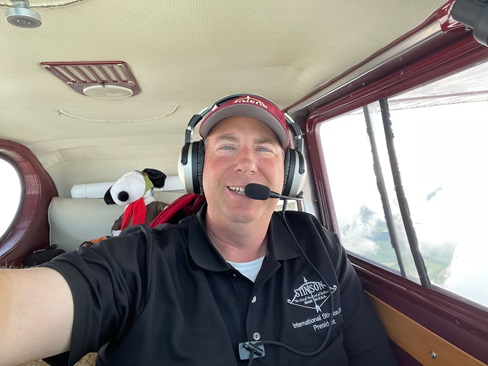Don't make the ADIZ permanent, Boyer tells federal panel
 AOPA President Boyer tells federal security officials that the ADIZ is a bad idea. |
"I implore you; don't take this bad idea and make it permanent!"
Nothing summed it up better than AOPA President Phil Boyer's presentation to collected federal security officials in the large hotel meeting room just next to Virginia's Dulles International Airport Wednesday afternoon. The hotel and the airport are deep inside the Washington, D.C., Air Defense Identification Zone (ADIZ), and Boyer was only the first of some 200 pilots ready to explain exactly why the ADIZ is a bad idea.
And for the first time in public, Boyer revealed his own personal bad experience with the ADIZ.
AOPA had requested this public meeting, and the one last week, because - as Boyer told the panel of Secret Service, Department of Defense, Customs and Border Patrol, Homeland Security, Transportation Security Administration, and FAA officials - "The voices and faces and the appeals of the affected pilots would have a greater effect [on you federal officials] than even the outpouring of written comments from across the nation."
| Click on the center arrow to start the video. |
Boyer said that some 90 percent of the nearly 20,000 written anti-ADIZ comments came from outside the Washington area, "mainly because [pilots] fear that the same thing that was done to Class B airspace here in this city could happen to 29 other places around the country."
Boyer detailed all of the steps that have been taken to improve general aviation security since the 9/11 attacks, including AOPA's Airport Watch Program.
"And don't just credit AOPA," said Boyer. "Credit the more than 600,000 pilots in this country that, like a neighborhood watch, are looking around the airport for untoward things happening."
And then Boyer revealed how he and his wife had been victims of the operational problems of the ADIZ.
"Let me go off script here. I've not told this story before publicly," said Boyer. On a Sunday afternoon in the summer of 2003, Boyer and his wife flew their Cessna 172 for a short pleasure flight between Frederick (FDK) and Carroll County Regional Airport (DMW) in Westminster, Maryland. Both airports are well outside the ADIZ.
But upon returning to Frederick, the Boyers were ordered to call ATC, and Lois Boyer, the pilot in command, was accused of violating the ADIZ.
"She went through hell," said Boyer. "And the next day, the FAA was still going to pursue an enforcement action."
Fortunately for the Boyers, their aircraft was equipped with ADS-B, meaning that even though they were squawking VFR, the aircraft could be uniquely identified on the radarscope. They were able to obtain the radar tapes and prove conclusively that they weren't near the ADIZ. Very few aircraft currently have ADS-B, so for most pilots, it's their word against the FAA's.
"The FAA assured us they would take steps to make sure this kind of mistaken identity never happened again," Boyer told the security officials. "It still happens all the time."
But more damaging was the effect the incident had on Lois. "She has flown maybe 10 hours total since then," said Boyer.
And that kind of effect was documented by other pilots speaking against the ADIZ. One pilot had purchased a Piper Arrow from a pilot who no longer flew because of the ADIZ. "I thought I got a great deal," he said. "Now I'm no longer sure."
He detailed how much more difficult it had become for him to fly from his airport inside the ADIZ. "Potomac Tracon is fed up with us little guys," he said. Perhaps because of the significantly greater workload imposed on controllers by the ADIZ, "they just don't seem to hear us anymore."
Others documented the loss of business. Matt Zuccaro, president of the Helicopter Association International, told how America Rising, which had operated a helicopter charter operation directly linking downtown New York and Washington, D.C., was closing its doors because of the ADIZ, at the loss of some $75 million.
Airports are failing. Developers have backed out of deals to build new hangars at Tipton Airport inside the ADIZ.
And Leesburg Executive Airport is also suffering. "The continued existence of the airport as a viable business entity is at stake," said Dennis Boykin of the Leesburg Airport Commission.
Many speakers said that the ADIZ did nothing to stop terrorists, but instead punished law-abiding pilots.
"This is an idiot's game," said James Coyne, president of the National Air Transportation Association. "All we're doing is punishing the law-abiding people. They deserve something better."
While the public meetings conclude Wednesday evening, written comments concerning the ADIZ will be accepted through February 6. Visit AOPA's ADIZ Member Action Center and learn how to help protect your freedom of flight.
January 18, 2006

